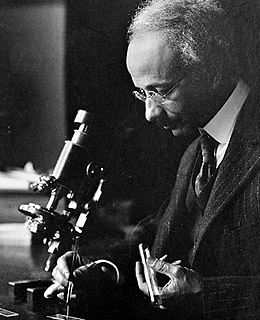
Make 2x the Impact Now
Make 2x the Impact Now
Our March Mission Match is underway, but not for long. Your gift by March 10 can go twice as far to advance research and help provide care and support for those living with Alzheimer’s and their caregivers.
Give NowIn celebration of Black History Month, Dr. Carl V. Hill of the Alzheimer’s Association shares the significant contributions of pioneer Solomon Carter Fuller, M.D. on dementia research, and discusses how diversity continues to play an integral part in Alzheimer’s research today.
 When Dr. Alois Alzheimer selected several doctors from around the globe to be his research assistants in Germany, one of them was Dr. Solomon Carter Fuller, the first known black/African American psychiatrist, whose work includes some of the earliest publications on dementia in America.
When Dr. Alois Alzheimer selected several doctors from around the globe to be his research assistants in Germany, one of them was Dr. Solomon Carter Fuller, the first known black/African American psychiatrist, whose work includes some of the earliest publications on dementia in America.
Dr. Fuller’s story is a remarkable one. Born in Africa in 1872, Dr. Fuller was the grandson of enslaved people in Virginia who purchased their freedom and moved to Liberia. After moving to the United States in 1889 to complete his undergraduate degree, Dr. Fuller graduated from the Boston University School of Medicine, a school open to all genders and racial/ethnic groups.
After completing medical school, Dr. Fuller conducted research in Dr. Alzheimer’s lab, doing anatomical preparations and examining the resulting brain samples. It was this work in this lab that led to the discovery of traits for disease in 1906 that bears Dr. Alzheimer’s name.
Diversity in Alzheimer’s Research
Dr. Alzheimer’s early 1900s lab was diverse, and the term ‘diversity’ has an important meaning for scientists on all levels of dementia research: everything researchers do is made up of competing perspectives and multiple ways of addressing difficult research questions and topics. Today, in 2020, we are still seeking much-needed diversity in how Alzheimer’s and dementia clinical trials are planned, as well as diverse scientists to carry out this priority research.
No doubt, there are big challenges in recruiting diverse participants in clinical trials. Racial/ethnic minorities are often not part of important studies, and given the lack of evidence collected, we don't have the assurance that drugs or therapies would be fully effective in African American, LatinX and Native American populations. This is why researchers are working hard to engage communities to create frameworks for dementia research of the future. This is an important time in this research area, and the wealth of resources that the Alzheimer’s Association has used to generate research opportunities in communities should grow from here.African Americans were in the fight to end dementia from the beginning.
Dr. Carl V. Hill
Dr. Fuller’s central presence in Dr. Alzheimer's lab makes a point about diversity. His involvement at the very beginning, providing his perspective as part of Dr. Alzheimer’s team, is an important legacy that should influence how we continue to move forward. It’s time for everyone to roll up their sleeves. African Americans were in the fight to end dementia from the beginning. This community being underrepresented in clinical trials as participants and researchers is simply inconsistent with dementia science.
Disparities Research
We know that African Americans are at increased risk: Older African-Americans are about twice as likely to have Alzheimer's or other dementias as older whites. In order to understand this, researchers should not take a ‘one size does not fit all’ approach when thinking about underrepresented populations and health disparities research.
Barriers in the African American community that are tied to historical realities and sociocultural beliefs about participating in research must also be addressed. Some racial/ethnic minority populations live in places with limited resources — like quality healthcare — and endure life with increased bias/stigma. These are just a few factors researchers should consider when planning and recruiting participants for clinical trials.
The Alzheimer’s Association encourages dementia researchers to explore health disparities, prioritizing racial and ethnic populations as they develop their research. As an important funding source of diverse early-career investigators, the Association allows researchers to develop clinical trial recruitment ideas and plans that will later inform best practices for everyone in the field. It’s truly a landmark time for change and innovation in the field of dementia science.
Hope Within Sight
Dr. Fuller made a huge contribution to our knowledge about Alzheimer’s dementia, and his legacy lives on. He provides hope to African Americans and other minorities: that they too can go on and make impactful contributions to science, especially dementia science.
Today, I'm encouraged by research that is taking a look at different pathways to Alzheimer's disease in diverse populations. Environmental, sociocultural and behavioral factors should all be included when determining the role of risk-reduction for disparities in Alzheimer’s dementia and all dementias. We are actively working with researchers in hopes that one day soon, we will have more answers. Today’s researchers should be inspired by Dr. Fuller’s legacy, and commit to diversity in their own labs and trials to strive for a common goal: to understand — and ultimately — end Alzheimer’s and all dementia in all populations.
About: Carl V. Hill, Ph.D., MPH, is the chief diversity, equity and inclusion officer for the Alzheimer’s Association, overseeing strategic initiatives to strengthen the Association’s outreach to all populations, and providing communities with resources and support to address the Alzheimer’s crisis. Dr. Hill previously served as director of the Office of Special Populations at the National Institute on Aging (NIA).
Related articles:
Research
Clinical Trials
